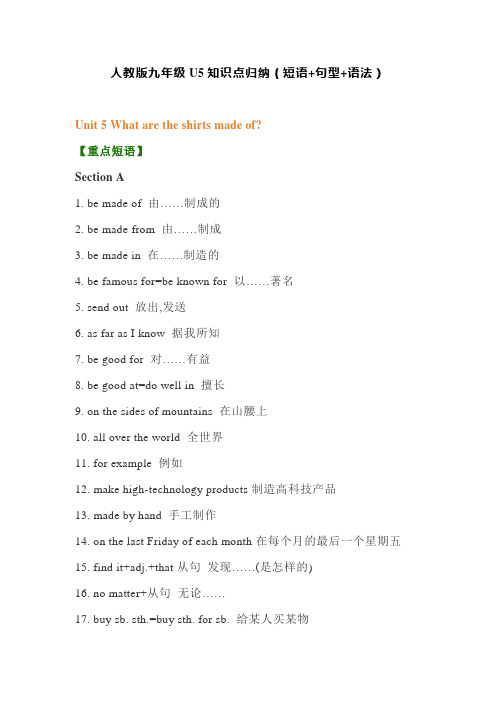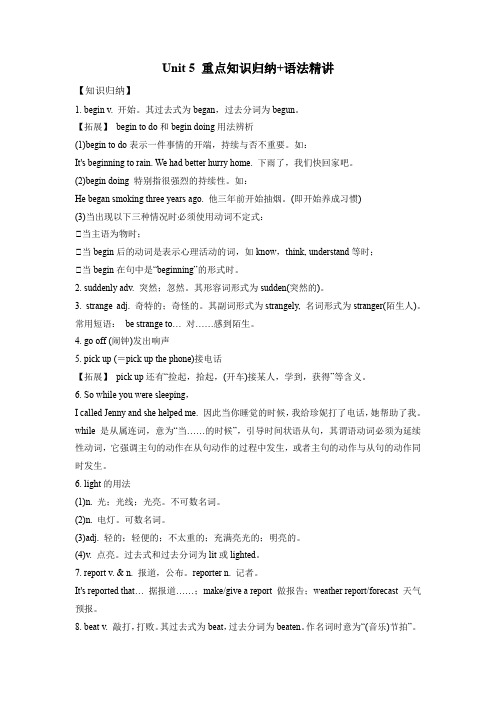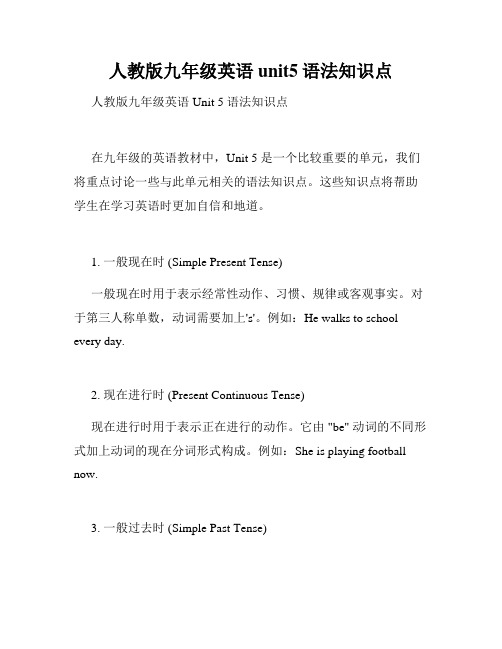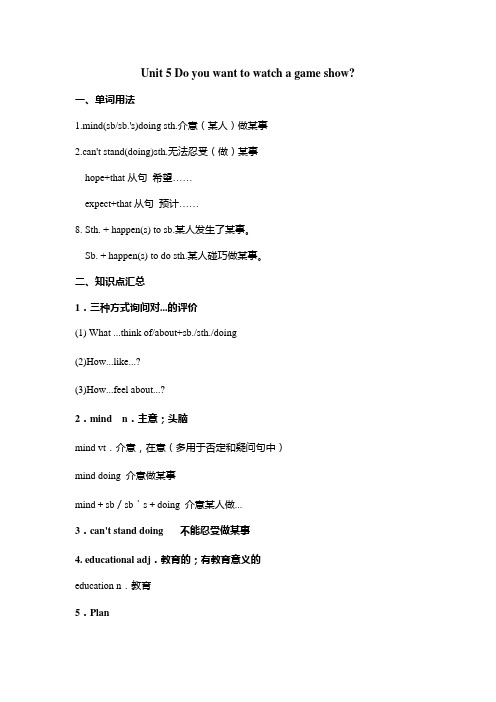Unit5语法
Unit+5知识点归纳(短语+句型+语法) 人教版英语九年级全册+

人教版九年级U5知识点归纳(短语+句型+语法)Unit 5 What are the shirts made of?【重点短语】Section A1. be made of 由……制成的2. be made from 由……制成3. be made in 在……制造的4. be famous for=be known for 以……著名5. send out 放出,发送6. as far as I know 据我所知7. be good for 对……有益8. be good at=do well in 擅长9. on the sides of mountains 在山腰上10. all over the world 全世界11. for example 例如12. make high-technology products制造高科技产品13. made by hand 手工制作14. on the last Friday of each month在每个月的最后一个星期五15. find it+adj.+that从句发现……(是怎样的)16. no matter+从句无论……17. buy sb. sth.=buy sth. for sb. 给某人买某物18. avoid doing sth. 避免做某事19. want to do sth. 想要做某事Section B1. the earth’s surface 地球表面2. traffic accident 交通事故3. a kite festival 风筝节4. turn…into… 把……变成……5. fly a kite =fly kites 放风筝6. be from=come from 来自7. many different kinds of 许多不同种类的8. such as 例如9. according to 根据;按照10. ask for help 请求帮助11. in trouble 处于困境中12. be covered with 用……覆盖13. rise into 上升;上涨14. a symbol of ……的象征15.during the Spring Festival 在春节期间16. paper cutting 剪纸17. good luck 好运18. put…on… 把……放在……上19. be used for doing sth. 被用于(做)……20. be used by 被……使用21. at a very high heat 在高温下22. sky lanterns 孔明灯23. fairy tale 童话故事24. go on a vacation to sp. 去某地度假25. “be+及物动词的过去分词”构成被动语态26. It seems that+从句好像……27. It takes sb. some time to do sth.做某事花费某人多长时间28. learn to do sth. 学会做某事29. allow sb. to do sth. 允许某人做某事30. be allowed to do 被允许做…31. try to do sth. 尽力做某事【重点句型】Section A1. What are the shirt made of?衬衫是由什么制成的?2. Is it made of silver?它是银质的吗?3. It was made in Thailand.它是在泰国制造的。
Unit 5 单元语法专题

【点拨】考查形容词的最高级,根据标志词of可知用最高 级形式。
考向二 不规则变化: 原级
good/well bad
many/much
far
比较级 better worse
more farther/ further
最高级 best worst
most farthest/ furthest
典例
To live a green life,we should try to save
【点拨】根据句意得知要用比较级,又因为answer是可 数名词单数,故选C。
典例 2 Of all the subjects,chemistry seems to be
____D____for me.(河北)
A.difficult
B.too difficult
C.more difficult
D.the most difficult
典例 If everyone pours less polluted water into the lake,it will be ___B_____. A.deeper and deeper B.cleaner and cleaner C.dirtier and dirtier D.wider and wider
A.can
B.may
C.must
D.need
【点拨】can表示推测,常用于否定句和疑问句中;may意 为“可能”,表示推测,但与后半句意思不符;must表示 推测,用于肯定句,意为“肯定”。由句意可知选C。
考向二 情态动词must,can,could,may,might表 示推测时,must表示的可能性程度最大,表 示“一定”。can,could,may,might都表 示“可能”,其中might表示的可能性程度最 小。可能性程度从大到小排列为 must → can→ could → may → might。
Unit5Grammar语法一般将来时七年级英语上册单元语法(牛津深圳版)

班级姓名学号分数Unit 5 Visiting the moon一般将来时(时间:60分钟,满分:100分)一般将来时:将来某个时间要发生的动作或者存在的状态,常与一些表示将来的时间的状语连用。
1.基本结构:一般由“助动词will+动词原形”或者“be going to +动词原形”构成。
2.注意:will是助动词,不能独立使用,否定形式是will not,缩写为won’t.3.时间状语:tomorrow,next time/week ,in a month/week,from now on ,soon.4.基本句型:(1)肯定句:主语+will/be going to +动词原形+其他如:He will e here at once.(2)否定句:主语+won’t/be not going to +动词原形+其他如:He will not go to Shenzhen.(3)一般疑问句:Will+主语+动词原形+其他?Be(am,are,is)+主语+动词原形+其他?如:Will you help me with my English?Are you going to Happy Valley of Shenzhen?(4)特殊疑问句:疑问词+一般疑问句?What will the students have for breakfast?5.will 和be going to 的区别:(1)will :与主观意图无关的将来,表示必然要发生的客观规律。
如:The flowers will e out in a few days.(2)be going to:一般表示计划、打算或准备要做的事情,和有迹象将发生或肯定要发生的事情。
如:Look! It’s going to rain.一、单项选择(本大题共50小题,每小题2分,共100分)1.Don’t return the video to Peter. I am going ________ it this evening.A.to watch B.watch C.watches D.watching2.Tomorrow is Saturday, we ________ my grandparents.A.visit B.are going to visit C.will visits D.are visiting3.Children’s Day is ing. I ________ a new bike for my daughter.4.The girl wants a new dress. She ________ it to her friend’s party.A.wears B.wore C.is wearing D.is going to wear 5.Perhaps there ______ terrible air pollution in the next few years.A.will have B.will beC.is going to have D.will be able to6.My father hopes you _________ to my home.A.will can e B.are e C.to e D.will e 7.—What’s your weekend plan? — I _______ football with my friends.A.play B.will play C.am playing D.is going to play 8.Mother ________ me a nice gift on my next birthday.A.will gives B.gives C.give D.will give 9.They _________ an English night next Sunday.A.are having B.are going to have C.will having D.is going to have 10.We have no vegetables in the fridge. I _________ and buy some.A.went B.was going C.will go D.to go 11.There ______ a talent show in our school tomorrow.A.are going to be B.are going to have C.is going to have D.is going to be 12.My parents ________ a birthday party for me the day after tomorrow.A.has B.have C.will have D.had13.The seeds ________ if you plant them in the soil.A.grow B.grew C.will grow D.are growing 14.There are many clouds ing. It ________ rain soon.A.am going to B.are going to C.is going to D.be going to 15.Is there going to ________ a football match in the stadium next month?A.being B.have C.be D.having 16.—Will they go out for a picnic?—______. They’ll fly kites in the park.A.Yes, they will B.No, they don’t C.No, they won’t D.Yes, they do 17.The weather ______ warm tomorrow.A.gets B.get C.are going to get D.will get 18.—________ they play games tomorrow afternoon?A.Will; will B.Are; are C.Do; do D.Did; do 19.The Smiths _________ the West Lake in Hangzhou next week.A.visit B.visitedC.visits D.are going to visit20.There ________ a meeting next weekend.A.is going to have B.is going to be C.will have D.has21.—Will his parents go to Japan tomorrow?—No, ________.A.they doesn’t B.they won’t C.they aren’t D.they don’t 22.Next month the children ________ to London with their parents.A.fly B.flew C.will fly D.is flying 23.—Do you buy any sugar, Lily?—Sorry, Mum. I ________ and buy some now.A.am going B.go C.went D.will go 24.What ________ you ________ tomorrow?A.do; do B.are; going C.do; going to do D.are; going to do 25.—________ you go climbing with us tomorrow?一Sorry. I stay at home with my parents tomorrow.A.Shall; will B.Are; will C.Do; am going to D.Will; am going to 26.There ________ a home robot for a family in the future, I think.A.will have B.has C.have D.will be 27.—Why are you in such a hurry, Mike?—There _______ an NBA basketball game in ten minutes.A.will have B.is going to have C.will be D.are going to be 28.Bill ________ his teacher next week.A.will visit B.visit C.visits D.visiting29.In the future, people ________ 4D printers to print anything they want.A.use B.are using C.will use D.is going to use 30.—Where is John?—He is out. He ________ back in an hour.A.e B.es C.will e D.cameA.will be B.was C.is D.will have32.I ________ Chinese food for my friends tomorrow evening.A.cook B.am cooking C.am going to cook D.cooked 33.I’m busy now. I ________ to you after school this afternoon.A.talk B.talked C.will talk D.am talking 34.There ___________ a talk show on CCTV2 this evening.A.will have B.is going to be C.is having D.is going to have 35.There ______ a basketball game in our school this evening.A.is going to have B.will have C.will is D.will be36.It ________, so you don’t need to take an umbrella.A.will rain B.won’t rain C.rains D.rain 37.Perhaps there _______ no summer or winter in the future.A.be B.have C.will be D.will have 38.There __________ an annual school sports meeting in the school next Monday.A.is going to have B.is going to isC.will be D.will have39.The weather report says that there ________ a heavy snow in Shenyang tomorrow.A.is B.will be C.is going to have D.will have 40.The Tshirt fits (适合) me. I’ll ________ it.A.takes B.taking C.take D.to take 41.You can see us on the playground tomorrow. We ________ football there.A.play B.played C.are playing D.will play 42.Jack’s parents and Jack _________ Beijing Opera next week.A.watched B.are going to watch C.watches D.watch 43.Machines ________ the heavy and difficult jobs in the future.A.do B.does C.did D.will do 44.—What’s your plan for the weekend, Helen?—I ________my grandparents.A.visit B.visited C.have visited D.am going to visit 45.In the future, maybe ________ traffic jams in the air.A.there is B.there was C.there are D.there will beA.enter B.entered C.will enter D.have entered 47.Tony’s parents ________ a film tomorrow evening.A.saw B.are going to see C.see D.are seeing48.I ________ a party next Saturday. I hope you can e.A.had B.was having C.have had D.will have49.—What are you saving money for?—Father’s Day is around the corner. I ________ a gift for my father.A.am going to buy B.have bought C.bought D.was buying 50.—Jim, you ________ late again!—Sorry, I ________ next time.A.are; don’t B.will be; won’t C.are; won’t D.will be; don’t51.We ________ a sports meeting this weekend if it rains.A.will have B.won’t haveC.have D.don’t have52.— What is your plan for next weekend, Lingling?— I _________litter in the park.A.am collecting B.am going to collectC.collect D.collects53.The notice says there ________ a sports meeting next Saturday at the munity center.A.will have B.has C.is going to have D.is going to be54.My uncle and I ________ the Great Wall next week. I’m looking forward to that.A.visit B.visited C.will visit D.are visiting 55.—What are you going to do this weekend, Tony?—I ________ a kite in the park with my friends.A.fly B.flew C.am flying D.am going to fly 56.Just go down the road, and you _________ the library next to the bank.A.see B.saw C.have seen D.will see57.The scarf is only 10 dollars. I ________ it.A.buy B.take C.will buy D.will take58.Bill ________ in America tomorrow afternoon.A.arrive B.arrives C.arrived D.will arriveA.have B.has C.will have D.is going to be 60.Hurry up! There are many black clouds in the sky. I’m afraid it ________.A.rains B.is raining C.was raining D.is going to rain参考答案:1.A【详解】句意:别把视频还给彼得。
Unit 5 重点知识归纳+语法 人教版八年级英语下册

Unit 5 重点知识归纳+语法精讲【知识归纳】1. begin v. 开始。
其过去式为began,过去分词为begun。
【拓展】begin to do和begin doing用法辨析(1)begin to do表示一件事情的开端,持续与否不重要。
如:It's beginning to rain. We had better hurry home. 下雨了,我们快回家吧。
(2)begin doing 特别指很强烈的持续性。
如:He began smoking three years ago. 他三年前开始抽烟。
(即开始养成习惯)(3)当出现以下三种情况时必须使用动词不定式:①当主语为物时;①当begin后的动词是表示心理活动的词,如know,think, understand等时;①当begin在句中是“beginning”的形式时。
2. suddenly adv. 突然;忽然。
其形容词形式为sudden(突然的)。
3. strange adj. 奇特的;奇怪的。
其副词形式为strangely, 名词形式为stranger(陌生人)。
常用短语:be strange to… 对……感到陌生。
4. go off (闹钟)发出响声5. pick up (=pick up the phone)接电话【拓展】pick up还有“捡起,拾起,(开车)接某人,学到,获得”等含义。
6. So while you were sleeping,I called Jenny and she helped me. 因此当你睡觉的时候,我给珍妮打了电话,她帮助了我。
while是从属连词,意为“当……的时候”,引导时间状语从句,其谓语动词必须为延续性动词,它强调主句的动作在从句动作的过程中发生,或者主句的动作与从句的动作同时发生。
6. light的用法(1)n. 光;光线;光亮。
不可数名词。
(2)n. 电灯。
可数名词。
人教版九年级英语unit5语法知识点

人教版九年级英语unit5语法知识点人教版九年级英语Unit 5 语法知识点在九年级的英语教材中,Unit 5 是一个比较重要的单元,我们将重点讨论一些与此单元相关的语法知识点。
这些知识点将帮助学生在学习英语时更加自信和地道。
1. 一般现在时 (Simple Present Tense)一般现在时用于表示经常性动作、习惯、规律或客观事实。
对于第三人称单数,动词需要加上's'。
例如:He walks to school every day.2. 现在进行时 (Present Continuous Tense)现在进行时用于表示正在进行的动作。
它由 "be" 动词的不同形式加上动词的现在分词形式构成。
例如:She is playing football now.3. 一般过去时 (Simple Past Tense)一般过去时用于表示过去某个特定的时间发生的动作或状态。
动词需要用过去式。
例如:I watched a movie last night.4. 过去进行时 (Past Continuous Tense)过去进行时表示过去某一时刻正在进行的动作或状态。
它由"was/were" 动词的不同形式加上动词的现在分词形式构成。
例如:They were studying when I called.5. 一般将来时 (Simple Future Tense)一般将来时用于表示将来某个时间将要发生的动作或状态。
通常使用 "will" 或 "be going to" 加上动词原形来构成。
例如:Wewill have a meeting next week.6. 现在完成时 (Present Perfect Tense)现在完成时用于表示过去某个时间开始并一直延续到现在的动作或状态。
它由"have/has" 加上动词的过去分词形式构成。
八年级英语unit5语法知识点

八年级英语unit5语法知识点Unit 5 Grammar: Understanding the Basics of English GrammarEnglish grammar may seem daunting to some, but it is the foundation of any language. In order to communicate effectively, one must have a solid grasp of grammar rules and syntax. In this article, we will explore the key grammar points covered in the 8th grade English Unit 5 curriculum.1. NounsNouns are words that refer to people, places, things, and ideas. They can be singular or plural and can be classified as common, proper, or collective.Common nouns are general, non-specific nouns such as dog, book, and computer. Proper nouns, on the other hand, are specific and often start with a capital letter such as Sarah, New York, and Google. Collective nouns refer to groups of people or things such as herd, family, and team.2. PronounsPronouns are words that take the place of nouns in a sentence. They help to avoid repetition and make sentences easier to read and understand.Personal pronouns are used to refer to people or things such as he, she, it, they, and we. Possessive pronouns indicate ownership, such as his, hers, and theirs. Demonstrative pronouns point to specific people or things, such as this and that.3. VerbsVerbs are action words that indicate what the subject of the sentence is doing. They can be regular or irregular and can be used in the past, present, or future tense.Regular verbs follow a specific pattern to form past tense, such as adding -ed at the end of the verb. Irregular verbs, on the other hand, do not follow a pattern and must be memorized individually. Examples of irregular verbs include eat, drank, and drove.4. AdjectivesAdjectives are words that describe or modify nouns. They can provide information about color, shape, size, age, and other characteristics.Adjectives are often placed before nouns in a sentence such as the green apple or the big house. They can also be used with linking verbs to describe the subject, such as she is beautiful or he seems tired.5. AdverbsAdverbs are words that describe or modify verbs, adjectives, and other adverbs. They provide information about how, when, where, or to what extent something is done.Adverbs can be formed by adding -ly to an adjective, such as slowly or quickly. Some adverbs, however, do not end in -ly, such as often and never.In conclusion, understanding the basics of English grammar is essential for effective communication. By mastering the key grammar points covered in Unit 5, students can improve their writing andspeaking abilities, and develop a stronger foundation for future language learning.。
Unit5知识点汇总及单元语法练习人教版英语八年级上册

Unit 5 Do you want to watch a game show?一、单词用法1.mind(sb/sb.'s)doing sth.介意(某人)做某事2.can't stand(doing)sth.无法忍受(做)某事hope+that从句希望……expect+that从句预计……8. Sth. + happen(s) to sb.某人发生了某事。
Sb. + happen(s) to do sth.某人碰巧做某事。
二、知识点汇总1.三种方式询问对...的评价(1) What ...think of/about+sb./sth./doing(2)How...like...?(3)How...feel about...?2.mind n.主意;头脑mind vt.介意,在意(多用于否定和疑问句中)mind doing 介意做某事mind+sb/sb's+doing 介意某人做...3.can't stand doing 不能忍受做某事4. educational adj.教育的;有教育意义的education n.教育5.Planplan to do=make a plan to do 计划做某事make a plan for 为......制定计划6.news 一则消息 a piece of news7.find out“查出”,强调经过一番了解和查询,弄明白某一情况。
find“找到,发现”指偶然或意外地发现,着重指找到的结果。
8.discussiondiscussion n. have a discussion about sb/sthdiscuss v.讨论discuss sth with sb9.happen 发生、出现sth+happens/happened to sb"某人发生了某事”(常指不好的事)sb.happens/happened to do sth “某人碰巧做某事”happen 指偶然发生或突发事件的发生;take place 指按计划或事先安排的发生10.expect to do...期待/期望做什么expect sb to do 期待/期望某人做某事hope:指对愿望实现有一定信心的希望.hope to do 不能用hope sb to do11.meaningless adj.无意义的meaningful adj.有意义的meaning(s)n.意思mean(s)v.意味着,意思是12.Jenjoyable令人愉悦11Scared15.famous adj.著名的;出名的作为...而出名be famous as...因...而出名be famous for对...而言出名be famous to...16.such as 诸如...;像;比如...1 prep.超过more thanover prep. 在......的正上方over adj.完了的,结束的下课。
人教版八年级下册英语Unit5知识点总结

人教版八年级下册英语Unit5知识点总结一、语法知识点A部分知识点1.过去进行时❶ 去进行时的构成及用法过去进行时由“助动词(was/were)+动词-ing”构成,表示在过去某一时刻或某一时间段正在进行的动作。
这一特定的过去时间除有上下文暗示以外,一般用过去的时间状语来表示。
如:then, at that time, at this time yesterday, at 10:00 yesterday morning, all right以及when/while从句等。
❶ 表示过去时间点正在进行的动作。
此时常伴明确的过去时间点等。
eg:She was reading a book at this time yesterday.昨天这个时候她正在看书。
(过去时间点正在进行的动作)I was watching TV then. 那时我正在看电视。
(过去时间点正在进行的动作)❶ 表示过去的某个阶段持续的动作。
eg:She was watching TV when the phone rang.(过去一段时间内持续的动作)她正在看电视,这时电话铃响了。
❶ 表示这一阶段反复发生的动作,带有褒贬感情色彩。
此时常伴有频度副词always等。
eg:The girl was always changing her mind.(过去反复发生的动作,带有感情色彩)这个女孩老是改变主意。
❶ 表示过去动作延迟到以后发生,即用过去进行表过去将来,此类动词是一些位置的变化的词。
eg:He told me that he was going soon.(过去进行表将来)他告诉我他很快就要走了。
❶ 过去进行时的一般疑问句句型:Be(Was/Were)+主语+现在分词+其他?肯定回答:Yes,主语+be(was/were).否定回答:No,主语+be(was/were) not.eg:--Were you cooking at that time? 那时,你在做饭吗?--Yes, I were.是的。
- 1、下载文档前请自行甄别文档内容的完整性,平台不提供额外的编辑、内容补充、找答案等附加服务。
- 2、"仅部分预览"的文档,不可在线预览部分如存在完整性等问题,可反馈申请退款(可完整预览的文档不适用该条件!)。
- 3、如文档侵犯您的权益,请联系客服反馈,我们会尽快为您处理(人工客服工作时间:9:00-18:30)。
U5特殊疑问词专项周检
班级_________ 姓名_________ 分数_________
一、根据汉语写出单词(20分)
1.什么_________________
2. 哪里__________________
3.谁____________________
4.谁的__________________
5. 怎么样________________
6.当…..时_______________
7.为什么________________
8. 哪一个________________
9. 多长时间_______________ 10.多久一次_______________11.多大年龄_____________ 12.什么颜色________________ 13.什么时间_______________ 14.多少钱______________ 15.哪个班级________________ 16.哪个年级_______________ 17.多高__________________ 18.多远____________________
19.多少(可数)____________________ 20. 多少(不可数)_____________________
二、根据句意填入适当的疑问词\疑问词组(33分)
1. __________is your name?
2. ___________class are you in?
3. ______________do you usually get up?
4. ___________ ___________is it now? ------It’s 9:30.
5. _______________is the man in a white shirt?
6. _________________cup is this? -------It’s Mike’s.
7. _______________are you late for school? ---Because my bike is broken.
8. _______________pen is this? -----It’s Millie’s.
9. ______________is better, the blue one or the red one?
10. _______________woman is your mother?
11. _______________does he go to school? ---By bike.
12. _____________ _____________is your coat? ----It’s black.
13. ______________ _____________do your parents get up? ---At 7o’clock.
14. _______________ ____________students are there in your class?
15. ______________ _______________milk is there in the bottle?
16. ________________ ____________do you go to the museum? ---Once a week.
17. _____________ ______________is your grandmother? ---She is 88 years old.
18. ___________ _______________does it take you from home to school by bike?
19. ____________ ______________is the building?
20. ___________ ________________is your home from school? ---About 3 kilometers.
21. _____________do your parents go to work? ----By bike.
22. ______________makes the pumpkin lantern? -----Juddy.
23. _______________do you like English? ----Because it’s interesting.
三、根据汉语提示填空(25分)
1.你想要买什么?_______________do you want to buy?
2.周末你想要去做什么?______________do you want to do at weekends?
3.你爸爸有多高?__________ ______________ is your father?
4.你的堂兄弟多大了?____________ _____________ is your cousin?
5.你更喜欢哪个颜色,蓝色还是白色?
______________ ____________do you like better, the blue one or the white one?
6.米莉多久去看望她外祖父母一次?
______________ ____________does Millie visit her grandparents?
7.你每天看多长时间电视?
______________ ______________do you watch TV every day?
8.你的台电脑多少钱?____________ ______________ is your computer?
9.这是谁的书包?______________bag is this?
10.你通常几点钟起床?
_______________ _____________do you usually get up?
11.你什么时候打网球?______________do you play tennis?
12.我们什么时间在哪里见面?
_______________ and ______________shall we meet?
13.这是谁的自行车?_____________bike is this?
14.你的姐姐多久去看一次电影?
____________ ____________does your sister go to see a film?
15冰箱里有多少面包?
______________ __________bread is there in the fridge?
四、对划线部分提问(22分)
1. My brother usually travels by train.
______________ ____________ your brother usually travel?
2. This is my book. ______________ _____________ is this?
3. Simon doesn’t come to school today because he is ill.
_____________ ______________Simon come to school?
4. They are doing their homework.
______________ _____________they doing?
5. Our classroom is on the second floor.
____________ _____________your classroom?
6. Jack walks his dog every Sunday evening.
______________does Jack ______________his dog?
7. We will meet at the school gate. ______________shall we meet?
8. We will meet at 5 o’clock on Saturday afternoon.
______________will you meet?
9. The boy in a black hat is Jack. ___________ ____________ is Jack?
10. This is my father’s car. ____________ __________ is this?
11. It’s an orange.
_____________ _____________ this?
12. There are 20 apples on the desk.
____________ ___________apples are there on the desk?
13. There are 20 apples on the desk.
______________on the desk?
14. My bike is white.
______________ ____________is your bike?
15. It takes me 2 hours to do my homework.
____________ ______________does it take you to do your homework?。
